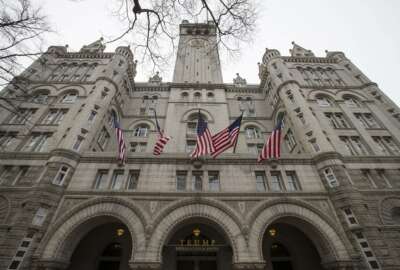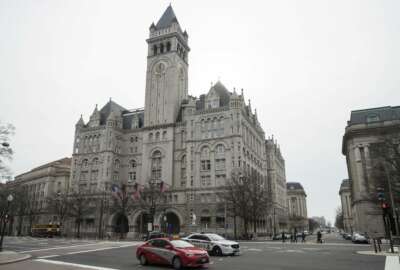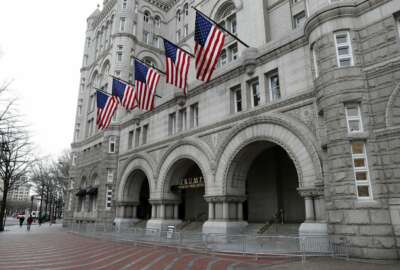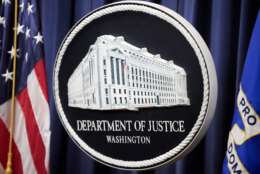
House Democrats press GSA or its watchdog to audit Trump Hotel lease
“We don't know whether we're getting a damn penny out of this thing or not,” Rep. Peter DeFazio (D-Ore.) said at Wednesday’s subcommittee hearing.
Democrats on the House Transportation and Infrastructure Committee are pressing the General Services Administration or its watchdog office to run an audit of its lease for the Trump Hotel, amid a series of pending lawsuits about the president’s stake in the government-owned property.
While committee members continue to raise constitutional concerns about President Donald Trump profiting from a lease he signed with GSA in 2013, barring elected officials from benefitting from the lease, lawmakers pursued a new line of inquiry at Wednesday’s hearing, asking the agency or its Office of Inspector General to examine whether the Trump Organization has paid the government what it owes under the terms of the lease.
Committee Chairman Peter DeFazio (D-Ore.) said GSA receives $3 million each year from the Trump Organization in rental payments, but hasn’t received additional funds based on the gross revenue of the hotel. Under the terms of the 60-year lease the Trump Organization signed with the GSA for the Old Post Office, the agency would receive a percentage of the building’s gross revenue if that revenue exceeded certain thresholds.
Annual certified financial statements indicate the Trump Hotel hasn’t yet hit those thresholds, but DeFazio said members of the committee have requested additional documents to verify whether or not GSA is getting its fair share of the revenue.
“We don’t know whether we’re getting a damn penny out of this thing or not,” DeFazio said at Wednesday’s subcommittee hearing.
Public Buildings Service Commissioner Dan Mathews said his agency has provided members of Congress with more than 10,000 pages of documents related to the Trump Hotel lease, as well as “numerous briefings,” but DeFazio said financial statements from the Trump Organization amount to a “cover page.”
Mathews told the committee he didn’t know offhand if PBS has audited other leases in the past, but said the agency manages more than 8,000 leases to the private sector that generate more than $5.6 billion a year in rent payments.
“It’s one of our top priorities,” Mathews said, adding that the agency goes through routine program management and contracting reviews.
Related Stories
“We’d have to think about that,” Ochoa said. “We certainly have oversight authority over the payment issue. We’d have to think carefully about the resources that it would take to do such an audit and any constraints on our ability to get the records independently of GSA. We’d have to think about whether it made sense for GSA to ask us to do that audit or to have an outside auditor with expertise.”
Mark Meadows (R-N.C.), the ranking member of the Subcommittee on Economic Development, Public Buildings and Emergency Management, dismissed Democrats’ push for an audit of the lease as a “fishing expedition” fueled by an ongoing legal battle over President Donald Trump’s financial stake in the government-owned property.
The Trump Organization, he added, has spent more than $200 million in restoring the Old Post Office, taking “a non-asset and made it into an asset.”
“If you had invested millions of dollars to upgrade the Old Post Office you would make sure that you’re making your monthly payments in accordance to the lease, so that you do not default on the lease,” Meadows said.
Congress passed the Old Post Office Building Redevelopment Act in 2008 to allow GSA to lease out the building while ensuring federal ownership.
Mathews said prior to Congress passing the bill and leasing out the Old Post Office, GSA had operated the property “at a significant loss.” In 2007 alone, the agency reported a $6.5 million loss in operating the building.
Latest Management News
“It was a dump. The first floor was used for street vendors,” Norton said. “You bet your life I was pleased to cut the ribbon on this dump and make it into a real asset for the federal government. It was underperforming, and in plain sight, the government was losing millions of dollars every day.”
Democrats on the committee, Meadows argued, have pushed for a probe of the Trump Hotel’s financials amid a drawn-out battle over whether President Donald Trump’s financial stake in the lease violates the emoluments clause of the Constitution.
An IG report earlier this year found that GSA had raised emoluments concerns following the 2016 presidential election, but agency lawyers “chose not to address those issues.”
A lawsuit from the attorneys general for Maryland and D.C. focused on the emoluments issue remains pending before a federal appeals court. Mathews told lawmakers the subject remains outside of PBS’s purview.
“With respect to the emoluments clauses, it would be inappropriate for GSA to weigh in on that issue while it is the subject of active litigations,” he said.
Copyright © 2024 Federal News Network. All rights reserved. This website is not intended for users located within the European Economic Area.
Jory Heckman is a reporter at Federal News Network covering U.S. Postal Service, IRS, big data and technology issues.
Follow @jheckmanWFED








